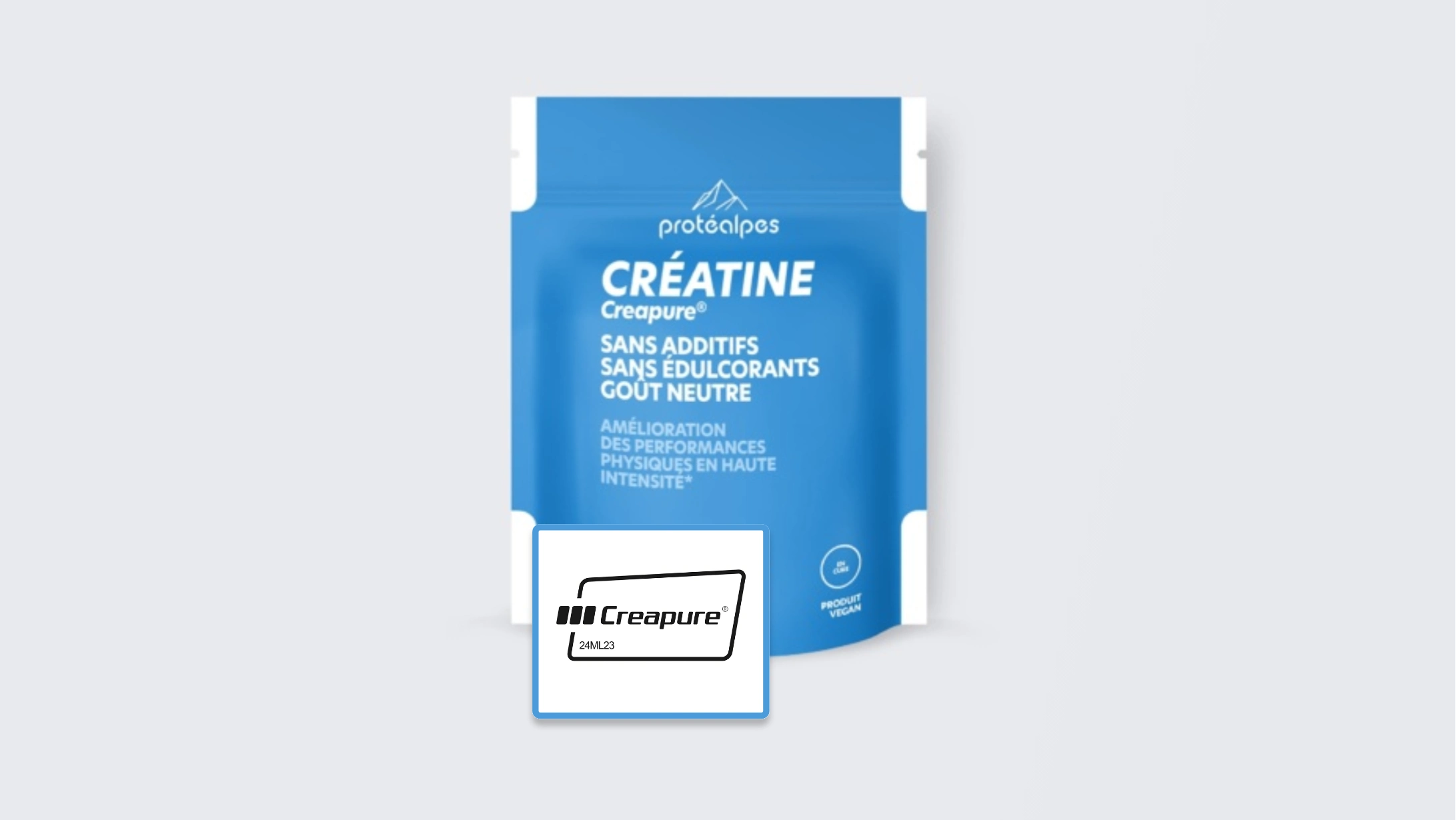Creatine monohydrate used in dietary supplements is normally 100% vegan, as it is produced by chemical synthesis in the laboratory, without any ingredients of animal origin.
Conversely, creatine naturally present in our diet is mainly found in animal products such as meat and fish, so people following a strict vegan diet may find themselves with naturally lower levels of muscle creatine, which can impact their sporting performance.
How is creatine monohydrate made?
The creatine monohydrate available as a dietary supplement is entirely synthesized in the laboratory, without any animal products. The manufacture of creatine therefore involves no animals whatsoever. This laboratory synthesis guarantees a high-quality, vegan end product when the process is mastered.
Butnot all creatines are created equal! The quality of the manufacturing process is essential to obtain a pure and effective product, without undesirable side effects.
Good to know: Creatine monohydrate can be produced using a variety of chemical synthesis methods.
The method used by AlzChem Trostberg GmbH to produce Creapure®, based on sarcosinate and cyanamide as raw materials, is considered the safest and most efficient.
Each batch of Creapure® undergoes individual purity tests before leaving the manufacturing plant. This rigorous production process guarantees a final product of consistently high quality.
The Creapure® label, issued by a German company, guarantees the best creatine monohydrate, in particular through :
- Made exclusively in Germany
- No cross-contamination
- Complete traceability of every batch
- Standardization of the manufacturing process

Why is supplementation useful for people following a vegan diet?
Origin and function of creatine
Creatine is a molecule naturally present in our bodies, mainly stored in the muscles. It is essential for rapid energy production during brief, intense physical effort.
Creatine has two main sources: it is synthesized by our body from three amino acids in the liver, kidneys and pancreas, at a rate of 1 gram per day.
The other half of our creatine supply comes from our diet, with most creatine-rich foods being animal products such as red meat, fish or poultry. Others, such as eggs and milk, contain creatine, but in very low doses.
As a reminder: creatine monohydrate used in dietary supplements is produced by chemical synthesis in the laboratory. This manufacturing process, totally independent of any animal source, makes this supplement compatible with a vegan diet.
Here's how creatine works in our bodies:
- Transforms into phosphocreatine to regenerateATP (adenosine triphosphate) during high-intensity exercise
- ATP provides the energy required for muscle contractions during physical effort
This molecule is thus used to execute short, intense and powerful movements. Without supplementation, our reserves are barely sufficient to "burn" it for ten seconds or so. The aim of creatine supplementation is therefore to maximize our reserves for greater muscular explosiveness.

For whom and why supplement?
Creatine supplementation is particularly relevant for athletes involved in explosive exercise, and less so for endurance sports.
Sports concerned by creatine supplementation:
- Team sports (soccer, rugby, handball, etc.)
- Contact sports (boxing, kickboxing, wrestling, etc.)
- Bodybuilding and weightlifting
- Sprints
- Crossfit, hyrox
Demonstrated effects of creatine include:
✓ Increased muscle strength
✓Improved power for short efforts
✓ Better recovery between sets
✓ Greater training volume
Studies confirm that creatine supplementation is particularly beneficial for vegan and vegetarian athletes, allowing them to compensate for their natural deficit while improving performance in their practice.
Vegetarian and vegan athletes, who potentially have more difficulty making creatine naturally and finding it in their diet, should consider supplementation to optimize their performance, particularly in anaerobic sports.1
Creatine monohydrate intake significantly increases creatine levels in muscle, plasma and red blood cells1.
Demonstrated benefits include1:
- Increased lean muscle mass
- Improved muscular strength and endurance
- Type II muscle fiber development
- Better average exercise power
- Positive effects on cognitive functions
Is creatinine vegan?
Watch out for this confusion!
This question doesn't really make sense. Creatine is a molecule naturally present in muscles, essential for supplying energy rapidly during short, intense efforts. Creatinine, on the other hand, is a waste product of creatine degradation by the body, eliminated mainly by the kidneys.
Measuring creatinine in the blood is one way of assessing kidney health. We come back to this in detail in our dossier on the difference between creatine and creatinine.
Conclusion
Creatine monohydrate is therefore perfectly compatible with a vegan lifestyle, since it is synthetically produced, without any ingredients of animal origin.
In addition to being 100% vegan, it represents a particularly interesting supplement for athletes following this diet, enabling them to compensate for their natural deficiency and optimize their sporting performance!
Once again, pay attention to the sources of the creatine you choose! Pay close attention not only to the primary source, but also to the packaging process, to guarantee impeccable traceability from factory to consumer.
Further information
- Find out if creatine makes you put on weight and what really explains it.
- Understand the link between creatine and water retention and unravel the truth about this phenomenon.
- Find out about the real risks of creatine-related tendonitis and the precautions to take.
- Just starting out or considering supplementation? Understand the basics with our complete guide: what is creatine?
- Before you start, find out about the ideal duration of a creatine cure and best practices for optimizing effects without overloading the body.
- Can creatine be taken during fasting or Ramadan? Discover the recommendations for taking creatine on an empty stomach or during fasting.
- Some users may experience intestinal discomfort: we take a look at digestive problems linked to creatine.
- Wondering if creatine is suitable for young people? Here's what you need to know about the minimum age for taking creatine.
- Finally, is creatine really useful for women? Discover all the benefits of creatine for women at every stage of life.















